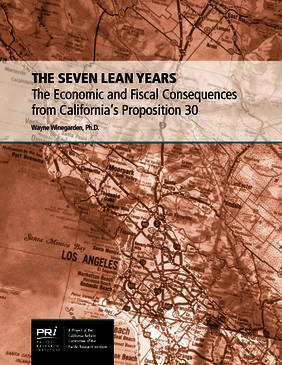The Pacific Research Institute, a non-partisan, non-profit think tank, today released a study on the effects of Prop. 30 on the states economy. The Seven Lean Years: The Economic and Fiscal Consequences from Californias Proposition 30 was authored by Wayne Winegarden, Ph.D, a senior fellow at the Pacific Research Institute. According to Dr. Winegarden, Prop. 30 increased the progressivity of Californias tax code, created additional budget rigidity, and decreased the incentives to work, save, and invest in the state.

Prop 30 (officially titled Temporary Taxes to Fund Education) raised the sales tax by one-quarter of 1 percent (from 7.25 percent to 7.50 percent) for four consecutive years. It also increased the marginal income tax for seven years for single filers who earned more than $250,000 a year from 9.3 percent to 10.3 percent. Beyond $250,000, the rates increase based on the level of income, with the highest rate at 13.3 percent for taxpayers who earned more than $1 million.
Based on Dr. Winegardens calculations, Prop. 30 reduced the after-tax income of the targeted taxpayers by $18,120 for every million dollars earned if the taxpayer is not subject to the Alternative Minimum Tax (AMT); if the taxpayer is subject to the AMT, his or her tax income was reduced by $30,000. Prop. 30 has reduced the return from saving, investing, and working in California, and is, consequently adversely influencing labor force participation and investment decisions, Dr.Winegarden said.
Moreover, the decision may prompt taxpayers to move to another state. For example, Dr. Winegarden calculates that the same investor or worker can now earn $80,332 more for the same investment simply by relocating to Nevada, if not subject to the AMT. If the AMT applies, the investor can earn $133,000 more if he or she moved to Nevada. Californias historical experience shows a consistent pattern: when the states top personal income tax rate increases, Californias share of the total personal income earned in the U.S. declines; the reverse is true when Californias top personal income tax rate decreases.
Dr. Winegardens analysis also shows that proponents of Prop. 30 failed to recognize that the states fiscal problems were not due to a lack of tax revenue but because of ineffective budgeting: Overly restrictive budget rules and lack of spending control in other budget areas are driving the states budget problems and crowding out spending on other services.
Instead of Prop 30s approach, fiscal and tax reforms should be implemented. First, Californias budget sclerosis should be addressed. The plethora of spending requirements and revenue earmarks makes it very difficult for legislators to effectively prioritize state spending. These spending requirements and budget earmarks should be repealed. Second, fiscal reforms should reduce the anti-growth incentives of Californias tax code. The starting point should be the reduction in marginal tax rates and the broadening of the tax base. Effective tax reform will incent more entrepreneurship and investment in California, creating a more robust state economy. Combined this with the states natural advantages, California will regain its position as a national economic leader, said Dr. Winegarden.
